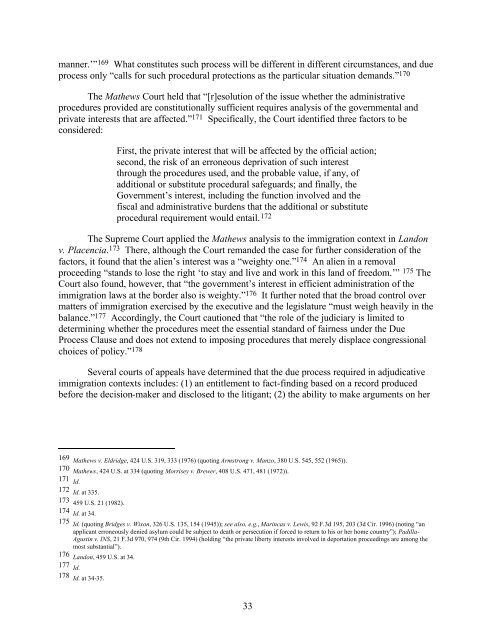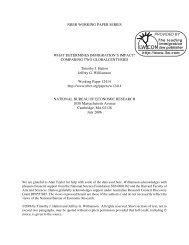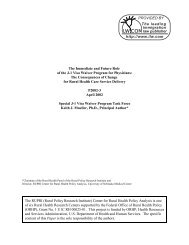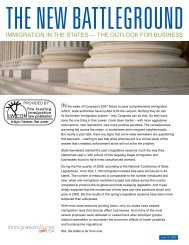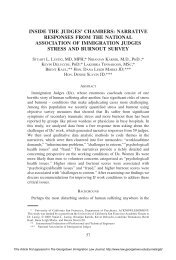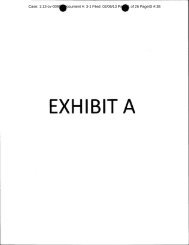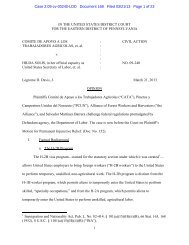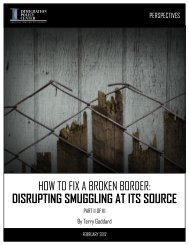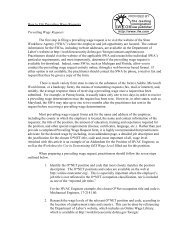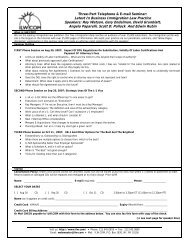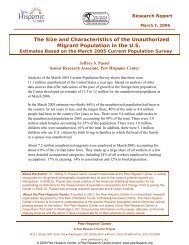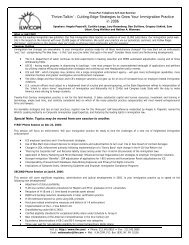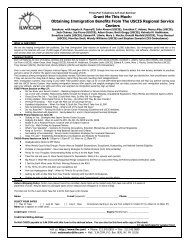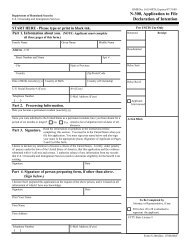Study of Board of Immigration Appeals Procedural Reforms - ILW.com
Study of Board of Immigration Appeals Procedural Reforms - ILW.com
Study of Board of Immigration Appeals Procedural Reforms - ILW.com
Create successful ePaper yourself
Turn your PDF publications into a flip-book with our unique Google optimized e-Paper software.
manner.’” 169 What constitutes such process will be different in different circumstances, and due<br />
process only “calls for such procedural protections as the particular situation demands.” 170<br />
The Mathews Court held that “[r]esolution <strong>of</strong> the issue whether the administrative<br />
procedures provided are constitutionally sufficient requires analysis <strong>of</strong> the governmental and<br />
private interests that are affected.” 171 Specifically, the Court identified three factors to be<br />
considered:<br />
First, the private interest that will be affected by the <strong>of</strong>ficial action;<br />
second, the risk <strong>of</strong> an erroneous deprivation <strong>of</strong> such interest<br />
through the procedures used, and the probable value, if any, <strong>of</strong><br />
additional or substitute procedural safeguards; and finally, the<br />
Government’s interest, including the function involved and the<br />
fiscal and administrative burdens that the additional or substitute<br />
procedural requirement would entail. 172<br />
The Supreme Court applied the Mathews analysis to the immigration context in Landon<br />
v. Placencia. 173 There, although the Court remanded the case for further consideration <strong>of</strong> the<br />
factors, it found that the alien’s interest was a “weighty one.” 174 An alien in a removal<br />
proceeding “stands to lose the right ‘to stay and live and work in this land <strong>of</strong> freedom.’” 175 The<br />
Court also found, however, that “the government’s interest in efficient administration <strong>of</strong> the<br />
immigration laws at the border also is weighty.” 176 It further noted that the broad control over<br />
matters <strong>of</strong> immigration exercised by the executive and the legislature “must weigh heavily in the<br />
balance.” 177 Accordingly, the Court cautioned that “the role <strong>of</strong> the judiciary is limited to<br />
determining whether the procedures meet the essential standard <strong>of</strong> fairness under the Due<br />
Process Clause and does not extend to imposing procedures that merely displace congressional<br />
choices <strong>of</strong> policy.” 178<br />
Several courts <strong>of</strong> appeals have determined that the due process required in adjudicative<br />
immigration contexts includes: (1) an entitlement to fact-finding based on a record produced<br />
before the decision-maker and disclosed to the litigant; (2) the ability to make arguments on her<br />
169 Mathews v. Eldridge, 424 U.S. 319, 333 (1976) (quoting Armstrong v. Manzo, 380 U.S. 545, 552 (1965)).<br />
170 Mathews, 424 U.S. at 334 (quoting Morrisey v. Brewer, 408 U.S. 471, 481 (1972)).<br />
171 Id.<br />
172 Id. at 335.<br />
173 459 U.S. 21 (1982).<br />
174 Id. at 34.<br />
175 Id. (quoting Bridges v. Wixon, 326 U.S. 135, 154 (1945)); see also, e.g., Marincas v. Lewis, 92 F.3d 195, 203 (3d Cir. 1996) (noting “an<br />
applicant erroneously denied asylum could be subject to death or persecution if forced to return to his or her home country”); Padilla-<br />
Agustin v. INS, 21 F.3d 970, 974 (9th Cir. 1994) (holding “the private liberty interests involved in deportation proceedings are among the<br />
most substantial”).<br />
176 Landon, 459 U.S. at 34.<br />
177 Id.<br />
178 Id. at 34-35.<br />
33


